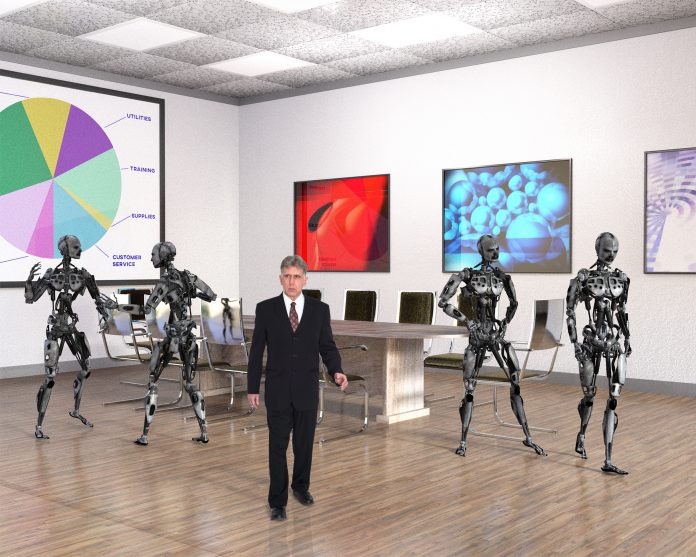Sam Davies, CEO and co-founder of RealLinks.IO discusses how artificial intelligence and technology can support many business functions, such as HR and recruitment in the digital age
There seems to be a grey cloud hovering over the idea of technology in the professional world. There is fear that artificial intelligence (AI) and new technologies will make human workers obsolete in as little as 20 years. The focus has always been on how technology will destroy jobs but there has been a minimal comment on how AI and technology can actually support business functions such as recruitment and retention. AI will replace tasks at work, not jobs. The sooner this is embraced, the easier we can make our work lives. There should be no question of the people versus technology, but rather people working with technology.
Human resources is arguably one of the most important departments in any reasonably sized organisation. What they lack in size, they certainly make up for in importance.
For a department that has to deal with such a wide range of assets within an establishment, artificial intelligence can make a big difference to the efficiency of a HR team.
The buzz of recruitment can easily be killed when the paper shifting and interview scheduling begins to feel laborious – this is where AI can be a game-changer. Bots screening for appropriate qualifications and facilitating interviews can save hours of time, freeing staff up for conducting actual interviews or spending time with clients.
AI can also help to ensure a level of diversity within the workplace with processes such as blind recruitment. AI can match candidate CVs to job descriptions, meaning that shortlisting decisions can be made based solely on data, rather than the demographic details attached, removing any bias from initial recruitment stages. Diversity in the workplace is thought to not only improve creativity but improves employee retention, and allows for companies to tap into a wider spectrum of experience and skill.
Employee referrals, an already very effective tool to find talent, can be supercharged by AI. The labour-intensive process of finding candidates can be streamlined with AI working to search for potential new employees, with the wealth of information that can be sourced from your current employee’s networks. We are so interconnected nowadays that our networks can serve us better.
One huge benefit AI does have over its human counterpart is that it has no necessity for sleep, providing a constant stream of resources to be tapped into.
Employee onboarding has been revolutionised with the help of artificial intelligence. Employers can share information with new staff via AI seamlessly and effortlessly without employees ever realising that they weren’t speaking to a real person. Guiding new employees through induction can be a breeze with the help of our ‘techy friend’.
According to the Society for Human Resource Management*, there are the four ‘Cs’ that make for the best all-round onboarding process – compliance, clarification, culture and connection. Information on specific workplace rules, regulations as well as job-specific role expectations and responsibilities can be automated and whilst AI is probably unable to convey the feel of a workplace, AI can give a helping hand in starting to introduce the prominent and most relevant staff members to their new team member.
The benefits of AI are not limited to recruitment and onboarding but in learning and development.
Artificial Intelligence can potentially revolutionise training within the workplace. It has already kick-started the demise of boring, generic, quizzes and tests. Utilising AI can be an easy way to personalise training to differentiate for things such as department and levels of ability. As well differentiating ability and training for job roles, AI can also be tailored to the new staff member’s preferred platform for their learning and development.
Those facilitating training and development can rely on AI to foster a safe environment for staff to make mistakes in. Imagine being able to create, innovate, hypothesise and experiment without risk – this is the staff development that AI can help to provide.
In addition to learning and development, staff retention can also be an issue when there is a plethora of other agencies and establishments that can be jumped ship to. AI can anticipate and determine the needs for staff, ensuring that they feel supported and comfortable, helping to deter any thoughts of leaving the workforce before they might start to present themselves.
We think that the main takeaway here is that artificial intelligence and technology is not, and will not be a replacement for a human workforce for a number of years. Using AI to automate the laborious and repetitive tasks means that staff can be free to use their creativity to great effect and to deal with tasks that require softer, more ‘human’ (excuse the pun) skills. Remembering that artificial intelligence is a tool that can ease the anxieties of those who are resistant to change. If your workforce are the rhythm section, technology and artificial technology are the bass line. Skills such as empathy, communication and critical thinking just cannot be mastered by technology like they are by humans.
That being said, the time saved from not needing to engage in dull, repetitive tasks such as transcription can be used in enriching staff and keeping morale high, or even spent developing those more ‘human’ skills to ensure that staff are communicating well and working together harmoniously and efficiently.
So many of us already utilise artificial intelligence in our homes with digital assistants, automated central heating systems and even internet-controlled kettles. It’s completely understandable why people may worry about the introduction of AI into the workplace, but with a little knowledge and understanding, the resistance to these tools within the workplace can be broken down. The fear of Artificial Intelligence is completely unwarranted, especially when we know how much of a benefit AI can be to us.
The sooner that we learn to live with, embrace and even love the technology we have been so lucky to have been presented with, the sooner we can learn how to use it to our advantage.
Sam Davies
CEO and co-founder











